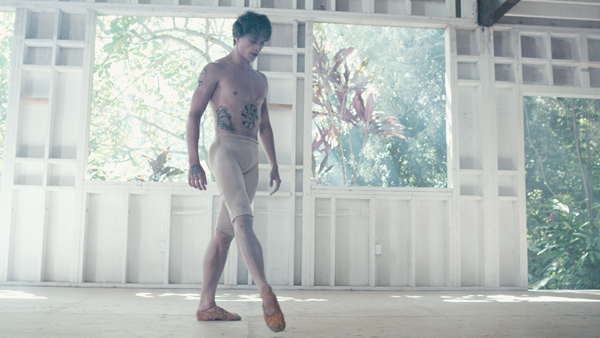Ukrainian-born Sergei Polunin is the current bad boy of ballet—he has tattoos, and he parties. At first, the documentary Dancer promises to deliver on a tell-all bio. Instead, it allows Polunin to tell his side of the story unchallenged.
Polunin’s mother, Galina, recognized her young son’s natural talent and moved with the boy from southern Ukraine to Kiev, where he could study at the Kiev State Choreographic Institute. Meanwhile, his father and grandmother emigrated to find work and send money to support him and his mother. At 13, Polunin moved to London to attend the Royal Ballet Academy, but Galina’s visa was denied, so she had to go back to Ukraine, leaving Sergei to fend for himself.
At school, Polunin proved to have much more raw talent than his peers, and the school bumped him up three levels. He began as a soloist, but the company knew they couldn’t hold him back. So, in 2009, at the age of 19, Polunin became the youngest principle performer in the history of the Royal Ballet.
All alone with no parental supervision, and the school being very aware of the golden goose they had at their disposal, Polunin began rebelling at an early age, testing the limits. Later, as the company pushed him to perform more, he pushed back, hard. He would go on drug benders, miss rehearsals, disappear for days at a time, and often perform under the influence of cocaine, which he claims made him a better dancer. Finally, in 2012, having achieved virtually everything a dancer could accomplish by the age of 22, he quit.
Because of his bad reputation, he was rejected by every prestigious ballet company in the United States. So, Polunin turned in the other direction and went to Russia, where he performed on a reality TV/contest show where his talents were largely wasted, and, although he achieved perfect scores, the hosts and judges made fun of his tattoos.
Tired of the system and the harsh life of a professional dancer, he later quit yet again. For his final balletic performance, he enlisted famed photographer David LaChapelle to make a music video of himself dancing to Hozier’s song, “Take Me to Church.” This piece was supposed to be Polunin’s goodbye to ballet. Well, not really. It goes viral.
There are plenty of longtime friends here to offer a sympathetic view of the dancer’s behavior. However, never are Polunin’s detractors given a voice except in brief news clips. The film is comprised of home videos and interviews of friends and family, but hardly ever do we hear a critical point of view.
Dancer belongs in the genre that could be dubbed, “It’s Hard to Be Famous, You Guys!” It’s getting tiresome, much in the same way as Never Say Never, a “documentary” about Justin Bieber. The similarities between him and Polunin, as portrayed in this film, are endless. In fact, there is an eerie subtext layered throughout Dancer that Polunin may actually be trying to be Justin Bieber. Take his drunken tirades on Twitter, which the Biebs is also known to do. Also, Polunin’s tattoos seem to be modeled after Bieber’s. (The camera gives most prominence to a likeness of Heath Ledger’s Joker.)
Even though the film does a fine job of presenting the audience with Polunin’s humble beginnings, the filmmakers never really take the time to examine his rebellious behavior, and there are clearly underlying issues which the film never fully delves into. In that case, Dancer is a missed opportunity to make a larger statement about the world of ballet, celebrity, and, in particular, what early success can do to a mind that hasn’t been given a chance to form on its own.

















Leave A Comment